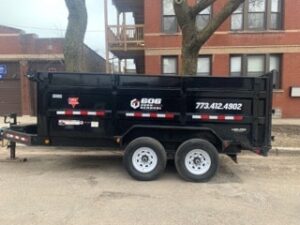
There’s more to a dumpster than just tossing waste—it’s a deliberate act of environmental decision-making. Renting a dumpster that aligns with sustainable practices means you’re not just cleaning up a space; you’re reshaping the future of that waste. It’s a conscious redirection—an effort to ensure that what can be salvaged, reused, or recycled doesn’t end up buried in a landfill. With the right provider, that battered old cabinet or stack of cardboard boxes gets a second life instead of a slow decay.
Eco-friendly dumpster rentals don’t come with flashy labels or green-colored bins—they reveal their integrity in what happens after pickup. It’s not about where the dumpster rests on your property, but where the waste goes next. Look into who’s behind the wheel, and you’ll often uncover the truth: whether they’re headed for careless dumping or mindful diversion.
Choose the Right Size Dumpster to Prevent Excess Waste
Picking the right dumpster size isn’t just a logistics decision—it’s an environmental one. Too large, and it becomes an invitation to over-discard, to toss things that maybe just needed a second thought or a second chance. It’s tempting when you see all that extra room to clean the house in a way that’s more reckless than responsible. On the flip side, rent one too small and you might need a second dumpster, doubling your environmental footprint and costs. The smart path lies in honest assessment.
What exactly are you getting rid of? Measure, list, estimate—and then choose a size that fits your needs, not your fears. Think of it as tailoring your waste disposal to your intentions, like fitting a suit for the occasion. When the container fits the job, you reduce waste, save money, and keep your cleanup mindful. The environment benefits when you ditch guesswork in favor of thoughtful sizing. Precision, not excess, is the real luxury.

Ask Your Dumpster Provider About Their Sorting Methods
What happens to your waste after it leaves your driveway? That’s not just a behind-the-scenes concern—it’s the heart of sustainable disposal. Many dumpster rental companies will tout “eco-friendly” practices, but unless they use sorting facilities or partner with recyclers, it may all end up buried without a second glance. Don’t be shy: ask where your debris goes and how it’s processed. Do they manually sort recyclables? Do they divert items to donation centers or partner with reuse organizations? Vague answers should raise red flags.
You’re not just hiring a bin—you’re investing in an entire process. A provider committed to proper sorting shows they care what happens after the haul, not just before. Think of it like farm-to-table, but for trash. Clean conscience, clean communities. You have the right to transparency. And more than that—you have the responsibility to demand it.
Separate Recyclables Before Tossing Them In
Recycling starts long before your junk hits the landfill—or even the dumpster. It starts with you, standing there, wondering what pile that broken lamp or torn-up cardboard box belongs in. The truth? The easiest way to keep waste out of the landfill is to never let it get mixed in with everything else. Once you toss that recyclable item into a bag of garbage, recovery rates plummet. Glass gets shattered and buried. Metals rust and vanish beneath layers of refuse.
But if you sort ahead of time—keeping cardboard with cardboard, metals with metals—you’re giving those items a real shot at new life. It takes a little planning, sure. Set up boxes. Label them. Even just stacking like with like can help. That small step before tossing creates massive downstream benefits. Recycling isn’t about heroics; it’s about habits. When we separate smartly, we reduce the contamination that ruins recycling efforts.
Time Your Rental for Maximum Efficiency and Minimal Trips
A dumpster is a tool—not a storage unit. When it shows up too early or sticks around too long, it becomes a temptation rather than a solution. You toss in things you didn’t plan to. You forget what’s buried at the bottom. And sometimes, you fill it too soon and need another. Efficiency is about planning your rental around when you’re ready to use it. That means scheduling it for the peak of your cleanup or renovation—not the idea phase.
It should arrive when you’ve already sorted, stacked, and decided what’s staying and what’s going. This cuts down on idle waste and unnecessary trips. Every pickup means gas, emissions, labor—and cost. One well-timed rental should do the job of many, if it’s synced with your process. Treat the dumpster like a guest with a purpose, not a piece of yard decor.
Avoid Throwing Prohibited or Hazardous Materials
Dumpsters might feel like black holes for junk, but they’re not immune to rules—or consequences. Tossing in prohibited items like paints, batteries, electronics, or household chemicals isn’t just a rule-breaker—it’s a danger to everyone down the disposal chain. These substances can leak, explode, catch fire, or seep into the earth. And let’s not forget the workers who sort through these materials. A single lithium battery can spark a blaze.
A container of bleach can corrode. When you rent a dumpster, you’re agreeing to respect its limitations. That means knowing what’s safe, what’s recyclable elsewhere, and what needs special handling. Read the list your provider gives you. If they don’t offer one, ask. Then double-check before tossing. It’s not about being a buzzkill—it’s about being a responsible citizen of the planet. Waste doesn’t vanish, it just moves on. Make sure it does so safely.
Donate What You Can Before Renting a Dumpster
It’s easy to go on a tossing spree when the dumpster arrives. But before you hear that satisfying thud of something landing inside, ask yourself: could someone else use this? Donation should be your first step, not your last thought. That old dresser? Someone might refurbish it. Those books? Perfect for a local school. The coat you haven’t worn in five years? Gold to a shelter. The less you load into the dumpster, the more room you save—and the less waste you generate.
You’re not just decluttering your home; you’re extending the life of your things. Donation lightens your environmental footprint, supports your community, and clears space more meaningfully than blind disposal ever could. Post items online, drop them off at charity shops, or even offer them to friends or neighbors. Giving a second life to your belongings is smarter than stuffing them in a bin.
Use Local Services That Support Green Disposal
Choosing a local dumpster rental company isn’t just a neighborly nod—it’s a smart sustainability move. Big-name haulers might have the trucks and the marketing, but they often lack the ties to your local waste ecosystem. They may dump at massive landfills far from town, with little concern for what could’ve been reused, donated, or recycled. Local providers, on the other hand, tend to have partnerships with area recycling centers, thrift shops, and even nonprofit organizations.
They know the terrain and care about their backyard—because it’s their backyard too. When you go local, you’re not just booking a bin; you’re joining a chain of mindful action. Ask where your waste goes. Ask if they recycle. Support companies that walk the walk, not just talk the green talk. Your dollars should go to people who reinvest in cleaner communities, not just corporate margins.
Limit the Use of Plastic and Non-Degradable Packaging
The way you package your waste matters just as much as what you’re tossing. Wrapping everything in layers of plastic might make cleanup feel neater, but it also shields recyclable and degradable materials from breaking down. Once that plastic-wrapped bundle hits a landfill, it could sit there for centuries—like a time capsule no one wants. Instead, use biodegradable options when possible. Cardboard boxes, paper bags, even reusable bins for sorting before dumping—these choices make decomposition quicker and processing easier.
Plastic bags not only clog machinery at sorting facilities but also disguise valuable materials inside. Want to make your load lighter on the planet? Start by bundling smarter. Reuse what you can. Avoid shrink-wrap and single-use plastics. Compostable liners, cloth sacks, and open bundling all make a difference. Every item you toss tells a story—but so does the packaging that surrounds it.
Encourage Others to Adopt Greener Dumpster Habits
Your sustainable dumpster rental can be more than a personal win—it can start a chain reaction. When your neighbors see you sorting your waste, donating before dumping, and choosing a local green-friendly provider, they notice. They may not say it, but they’re watching. And habits spread best through example, not preaching. Maybe it sparks a conversation. Maybe someone asks where you got your bin. That’s your moment to share—not to lecture, but to explain what worked and why it matters.
We influence more than we know. A simple post on social media showing how you separated recyclables or donated items can inspire dozens of others to rethink their own waste. Sustainability thrives on community, not isolation. So don’t just clean up—speak up. Share your choices. Celebrate the wins. Change doesn’t come from mandates; it comes from momentum.
Conclusion
Eco-conscious waste management begins long before you hear the clang of the dumpster hitting the pavement. It starts with a shift in mindset—where every decision, from decluttering your garage to renovating your kitchen, becomes an opportunity to make a positive impact. It’s about thoughtful choices at every stage—what to keep, what to donate, what can be reused, what to recycle, and who to trust with the rest.
For Chicago residents who want to rent a dumpster with integrity and purpose, 606 Junk Removal and Dumpster Rental leads the charge. Located in Chicago, IL, their environmentally responsible team can be reached at 773-412-4902 or by email at info@606junk.com. Choose wisely, discard mindfully, and let your cleanup leave a legacy—not a landfill. Whether it’s a home renovation or a major cleanout, partner with a team that turns waste into a step toward sustainability.
